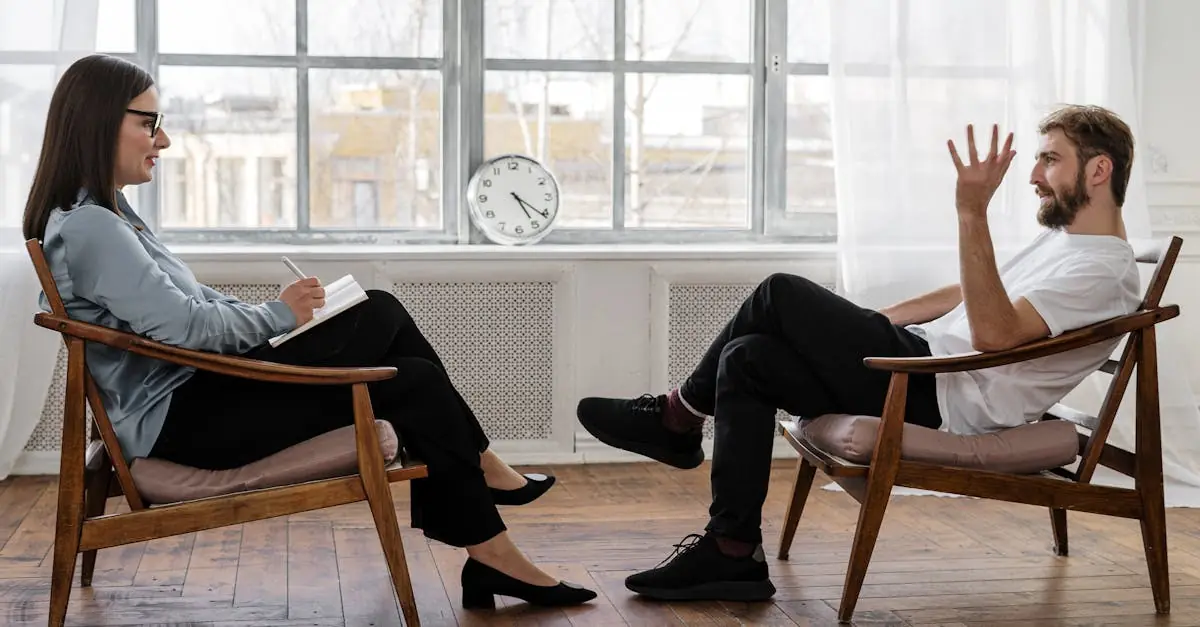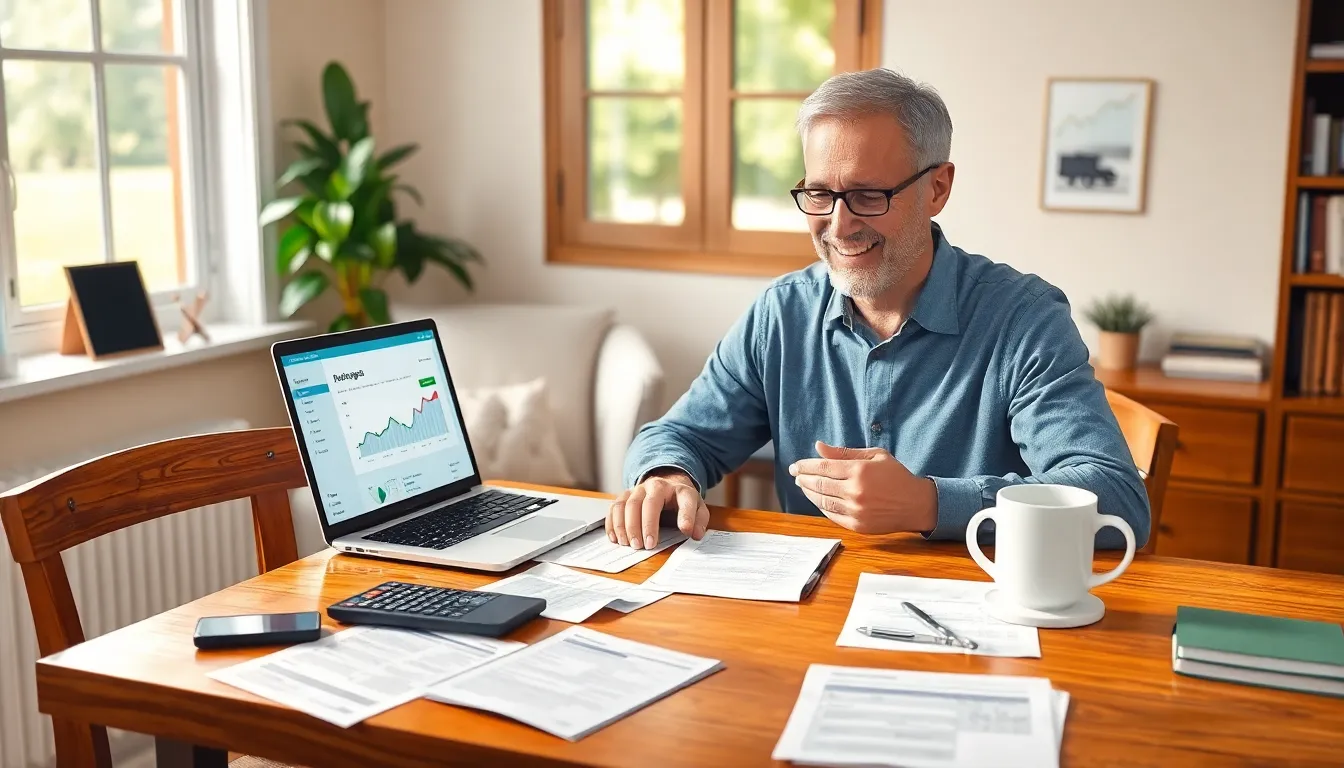Relationships can feel like a rollercoaster ride—thrilling highs and gut-wrenching lows. When lovebirds find themselves in a tailspin, relationship counseling can be the safety harness that keeps them from flying off the tracks. Whether it’s miscommunication, trust issues, or just the everyday grind that’s causing friction, expert advice can help couples navigate the twists and turns with grace and humor.
Imagine sitting down with a counselor who not only understands the intricacies of love but also knows how to make you chuckle through the tough stuff. With the right guidance, couples can turn misunderstandings into opportunities for growth and laughter. So, if your relationship feels more like a sitcom than a romantic drama, it might be time to explore some solid counseling advice that can help transform those awkward moments into stepping stones toward a stronger bond.
Table of Contents
ToggleUnderstanding Relationship Counseling Advice
Understanding relationship counseling advice involves recognizing methods for improving connection and communication within a partnership. Couples often turn to counseling when facing challenges that disrupt harmony.
What Is Relationship Counseling?
Relationship counseling is a therapeutic process where couples work with a trained professional to address issues within their relationship. Sessions typically focus on identifying patterns of behavior that lead to conflicts. Counselors facilitate discussions to allow partners to express their feelings openly. Creating a safe environment encourages honest dialogue, fostering deeper understanding. Techniques may include communication exercises and conflict resolution strategies. Each session aims to empower both individuals, guiding them toward healthier interactions.
Importance of Seeking Counseling
Seeking counseling is crucial when couples encounter persistent issues like miscommunication or trust erosion. Professional guidance provides both partners with tools to navigate conflicts effectively. An unbiased third party can offer insights that partners may overlook. Often, counseling leads to improved emotional connections and enhances overall relationship satisfaction. Addressing problems early reduces the risk of long-term damage. Couples who invest in counseling benefit from personalized strategies tailored to their unique dynamics. Prioritizing counseling transforms challenges into opportunities for growth.
Common Issues Addressed in Counseling
Counseling often helps couples navigate a variety of challenges that arise in their relationships. Common issues tackled include communication problems, trust and betrayal, and conflict resolution.
Communication Problems
Misunderstandings often stem from ineffective communication. Couples may express feelings inadequately, leading to frustration and disconnection. Through counseling, individuals learn to articulate thoughts clearly, using active listening techniques. They practice expressing needs respectfully, which fosters a healthier dialogue. Strategies like “I” statements help minimize defensiveness, allowing for more constructive conversations. Effective communication forms the backbone of a strong relationship, guiding partners toward harmony and mutual understanding.
Trust and Betrayal
Trust breaches shake the foundation of any relationship. Infidelity or dishonesty causes emotional pain and insecurity. Counselors facilitate discussions about feelings surrounding betrayal, encouraging honesty and vulnerability. They help couples explore underlying issues that contributed to the breach. Rebuilding trust takes time and effort. Guided by a counselor, partners establish new boundaries and expectations to create a safer emotional environment. Restoration of trust ultimately leads to deeper intimacy and a more resilient bond.
Conflict Resolution
Conflict is an inevitable part of relationships. Disagreements can escalate without proper management, leading to resentment. Counseling emphasizes the importance of finding resolutions rather than assigning blame. Couples engage in role-playing to understand different perspectives and practice resolving disputes healthily. Having structured techniques enables partners to navigate conflicts effectively, promoting cooperation. Ultimately, this fosters an atmosphere of respect and empathy, turning challenges into opportunities for growth.
Effective Strategies for Relationship Improvement
Implementing effective strategies enhances relationship dynamics. Couples facing challenges benefit from practical techniques in counseling.
Active Listening Techniques
Active listening fosters clarity and connection. Encourage partners to paraphrase each other’s statements, ensuring they truly understand one another. Asking open-ended questions promotes deeper discussions. Additionally, maintaining appropriate eye contact demonstrates engagement. Utilizing reflective listening, where one partner summarizes the other’s thoughts, creates a safe environment for sharing. Avoiding interruptions during conversations allows each person to express feelings fully. These techniques strengthen bonds and contribute to effective communication.
Building Empathy and Understanding
Building empathy strengthens emotional connections. Couples should practice putting themselves in each other’s shoes, fostering mutual respect. Sharing personal experiences related to issues enhances understanding. It’s beneficial to validate feelings, showing acknowledgment and support. Couples can set aside time for heart-to-heart discussions, prioritizing emotional honesty. Using “I” statements encourages self-expression without placing blame. Creating rituals of connection, such as weekly check-ins, nurtures a supportive relationship climate. Prioritizing empathy leads to healthier interactions and greater fulfillment.
Finding the Right Counselor
Selecting the right counselor significantly impacts the effectiveness of relationship counseling. Couples should consider specific questions to ensure compatibility with potential counselors.
Questions to Ask Potential Counselors
Inquire about their approach to counseling. Understanding their methodology can help determine if it aligns with couple goals. Ask about their experience working with similar issues, such as communication or trust problems. This helps gauge their expertise. Discuss session frequency and structure to ensure it fits into schedules. Clarifying expectations ensures both partners are on the same page. Lastly, don’t forget to address confidentiality policies, as trust in the process is crucial.
Credentials and Specializations
Check for appropriate credentials. Verify that the counselor holds a relevant degree in psychology or counseling. Look for licenses and certifications from respected organizations, indicating professional training and adherence to ethical standards. Specializations matter, too. A counselor with experience in resolving specific issues, such as infidelity or anxiety, can provide valuable insights. Couples should explore the counselor’s background in relationship dynamics, as this expertise fosters healthier connections. Prioritize professionals with a track record of helping couples navigate challenges effectively.
Embracing relationship counseling can be a transformative step for couples navigating the complexities of their partnership. By engaging with a trained professional, they can uncover deeper insights into their communication styles and emotional needs. This process not only addresses immediate conflicts but also lays the groundwork for a more resilient bond.
Utilizing effective strategies like active listening and empathy fosters a nurturing environment where both partners feel heard and valued. Choosing the right counselor is crucial for this journey, as compatibility can significantly influence the counseling experience. With commitment and the right support, couples can turn their challenges into opportunities for growth, ultimately enriching their relationship and enhancing overall satisfaction.




